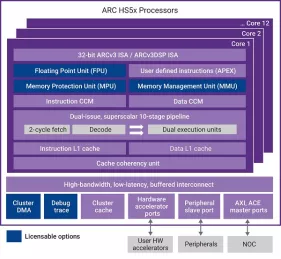L2 Cache IP
Filter
Compare
105
IP
from
21
vendors
(1
-
10)
-
L2 cache option for multicore versions of ARC HS36 and HS38 processors
- Achieves up to 3232 DMIPS and 6681 CoreMarks* at 1.61 GHz on 28HPM (single-core configuration, worst case silicon and conditions)
- Delivers 2.13 DMIPS/MHz, 4.15 CoreMarks/MHz* (per core)
- High-speed, 10-stage pipeline
- Up to 16MB instruction and data close coupled memory (CCM)
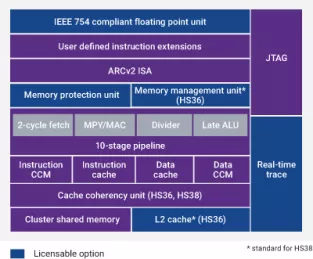
-
Efficient Linux-capable application core with a 9-stage in-order pipeline, an MMU, L1 and L2 caches, and cache coherency
- SCR5 is an efficient, silicon-proven, entry-level Linux-capable 32/64-bit RISC-V processor core.
- The SCR5 core fully supports RISC-V standard "I" Integer, "M" Integer Multiplication and Division, "A" Atomic, "C" 16-bit Compressed, "F" Single-Precision Floating-Point, "D" Double-Precision Floating-Point, “B” Bit Manipulation, and “K” Scalar Cryptography extensions.
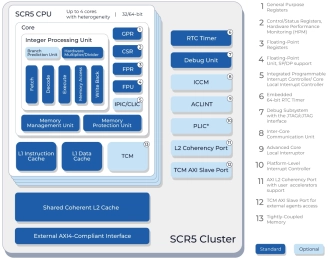
-
L2 cache/cluster shared memory option for multicore versions of ARC HS5x and HS6x processors
- Dual-issue, 64-bit processors for high-performance embedded applications
- 52-bit physical and 64-bit virtual addressing
- Up to 5400 DMIPS and 11,088 CoreMark per core at 1.8 GHz on 16FFC (worst case conditions, single-core configuration
- Multicore Processor versions with up to 12 CPU cores and up to 16 hardware accelerators
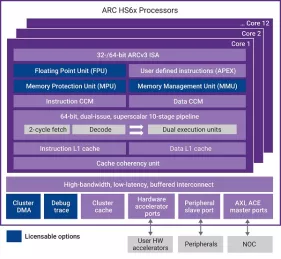
-
Efficient microcontroller core with a 5-stage in-order pipeline, privilege modes, an FPU, an MPU, L1 and L2 caches
- SCR4 is a 32/64-bit RISC-V low-power, high-performance, area-optimized processor core with floating-point arithmetic functionality.
- The SCR4 core fully supports RISC-V standard "I" Integer, "M" Integer Multiplication and Division, "A" Atomic, "C" 16-bit Compressed, "F" Single-Precision Floating-Point, "D" Double-Precision Floating-Point, “B” Bit Manipulation, and “K” Scalar Cryptography extensions.
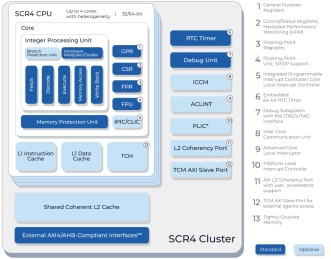
-
Efficient microcontroller core with a 5-stage in-order pipeline, privilege modes, an MPU, L1 and L2 caches
- SCR3 is an efficient, silicon-proven, microcontroller-class, 32/64-bit RISC-V processor core.
- It is optimized for power-sensitive, small-area, embedded applications, that demand high performance.
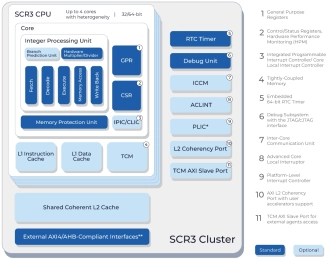
-
High-performance Linux-capable application core with a 12-stage dual-issue out-of-order pipeline, a VPU, cache coherency, and a hypervisor
- SCR9 is a high-performance, silicon-proven, Linux-capable 64-bit RISC-V processor core for entry-level server-class applications and personal computing devices.
- The SCR9 core supports RISC-V standard "I" Integer, "M" Integer Multiplication and Division, "A" Atomic, "C" 16-bit Compressed, "F" Single-Precision Floating-Point, "D" Double-Precision Floating-Point, "V" Vector Operations, "B" Bit Manipulation, and "K" Scalar Cryptography extensions.
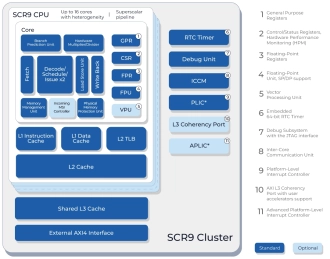
-
ARC HS66MP multi-core version of dual-issue HS66 with I and D cache for high-performance embedded applications
- Dual-issue, 64-bit processors for high-performance embedded applications
- 52-bit physical and 64-bit virtual addressing
- Up to 5400 DMIPS and 11,088 CoreMark per core at 1.8 GHz on 16FFC (worst case conditions, single-core configuration
- Multicore Processor versions with up to 12 CPU cores and up to 16 hardware accelerators
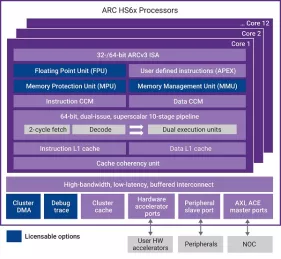
-
ARC HS57DMP multi-core version of dual-issue HS57D ARCv3DSP ISA, with I&D cache
- Dual-issue, 32-bit processors for high-performance embedded applications
- Deliver up to 5400 DMIPS and 11,088 CoreMark per core at 1.8 GHz on 16FFC (worst case conditions, single-core configuration)
- Multicore Processor versions with up to 12 CPU cores and up to 16 hardware accelerators
- Based on advanced ARCv3 ISA
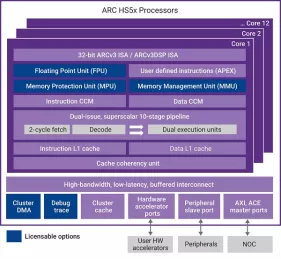
-
ARC HS57D 32-bit, dual-issue processor core and interconnect, ARCv3DSP ISA, with I&D cache
- Dual-issue, 32-bit processors for high-performance embedded applications
- Deliver up to 5400 DMIPS and 11,088 CoreMark per core at 1.8 GHz on 16FFC (worst case conditions, single-core configuration)
- Multicore Processor versions with up to 12 CPU cores and up to 16 hardware accelerators
- Based on advanced ARCv3 ISA
